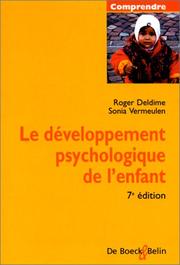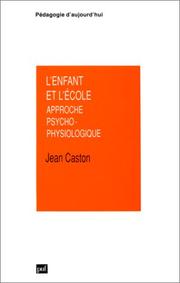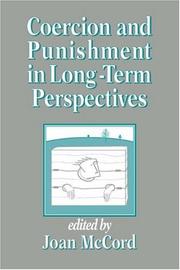| Listing 1 - 10 of 30 | << page >> |
Sort by
|
Book
ISBN: 9782804159092 Year: 2008 Volume: *1 Publisher: Bruxelles : De Boeck Université,
Abstract | Keywords | Export | Availability | Bookmark
 Loading...
Loading...Choose an application
- Reference Manager
- EndNote
- RefWorks (Direct export to RefWorks)
Behavior [Child ] --- Child behavior --- Child psychology --- Children--Psychology --- Enfants--Psychologie --- Kinderen--Psychologie --- Kinderpsychologie --- Psychologie [Kinder] --- Psychologie de l'enfant --- Psychologie infantile --- Psychology [Child ] --- Children's drawings --- Psychological aspects

ISBN: 2701122570 2804122611 9782804122614 Year: 1997 Volume: *7 Publisher: Bruxelles Paris A. De Boeck Belin
Abstract | Keywords | Export | Availability | Bookmark
 Loading...
Loading...Choose an application
- Reference Manager
- EndNote
- RefWorks (Direct export to RefWorks)
Behavior [Child ] --- Child behavior --- Child psychology --- Children--Psychology --- Development (Psychology) --- Developmental psychology --- Développement [Psychologie du ] --- Enfants--Psychologie --- Kinderen--Psychologie --- Kinderpsychologie --- Ontwikkelingspsychologie --- Psychologie [Kinder] --- Psychologie [Ontwikkelings] --- Psychologie de l'enfant --- Psychologie du développement --- Psychologie infantile --- Psychology [Child ] --- Enfants --- Psychologie
Book
ISBN: 9782804164072 2804164071 Year: 2011 Volume: *5 Publisher: Bruxelles : De Boeck,
Abstract | Keywords | Export | Availability | Bookmark
 Loading...
Loading...Choose an application
- Reference Manager
- EndNote
- RefWorks (Direct export to RefWorks)
Behavior [Child ] --- Child behavior --- Child psychology --- Children--Psychology --- Enfants--Psychologie --- Kinderen--Psychologie --- Kinderpsychologie --- Psychologie [Kinder] --- Psychologie de l'enfant --- Psychologie infantile --- Psychology [Child ] --- Drawing --- Drawing, Psychology of --- Dessin --- Study and teaching --- Etude et enseignement --- Psychologie --- Children's drawings --- Psychological aspects
Book
ISBN: 9010100073 Year: 1970 Publisher: Amsterdam Brussel Agon Elsevier
Abstract | Keywords | Export | Availability | Bookmark
 Loading...
Loading...Choose an application
- Reference Manager
- EndNote
- RefWorks (Direct export to RefWorks)
ontwikkelingspsychologie --- Educational psychology --- Adolescence -- Psychologie --- Adolescence -- Psychology --- Adolescent psychology --- Adolescenten -- Psychologie --- Adolescentie -- Psychologie --- Adolescents -- Psychologie --- Behavior [Child ] --- Child behavior --- Child psychology --- Children--Psychology --- Enfants--Psychologie --- Kinderen--Psychologie --- Kinderpsychologie --- Psychologie [Kinder] --- Psychologie dans l'adolescence --- Psychologie de l'enfant --- Psychologie in adolescentie --- Psychologie infantile --- Psychology [Child ] --- Teenagers -- Psychologie --- Teenagers -- Psychology --- Ontwikkelingspsychologie

ISBN: 2130449360 Year: 1993 Volume: vol *15 Publisher: Paris PUF
Abstract | Keywords | Export | Availability | Bookmark
 Loading...
Loading...Choose an application
- Reference Manager
- EndNote
- RefWorks (Direct export to RefWorks)
Behavior [Child ] --- Child behavior --- Child psychology --- Children--Psychology --- Education --- Enfants--Psychologie --- Enseignement --- Kinderen--Psychologie --- Kinderpsychologie --- Onderwijs --- Psychologie [Kinder] --- Psychologie de l'enfant --- Psychologie infantile --- Psychology [Child ] --- Experimental methods --- Méthodes expérimentales --- Learning, Psychology of --- Learning --- Child Development --- Physiological aspects --- Méthodes expérimentales
Book
ISBN: 9782870035290 2870035292 Year: 2010 Publisher: Charleroi Couleur livres
Abstract | Keywords | Export | Availability | Bookmark
 Loading...
Loading...Choose an application
- Reference Manager
- EndNote
- RefWorks (Direct export to RefWorks)
Behavior [Child ] --- Child behavior --- Child psychology --- Child raising --- Child rearing --- Children development and guidance --- Children management --- Children training --- Children--Psychology --- Education des enfants --- Enfants éducation --- Enfants--Psychologie --- Kinderen opvoeding --- Kinderen--Psychologie --- Kinderpsychologie --- Opvoeding van kinderen --- Psychologie [Kinder] --- Psychologie de l'enfant --- Psychologie infantile --- Psychology [Child ] --- Raising of children --- Rearing of children --- Training of children --- Dolto, Françoise --- Appreciation
Book
ISBN: 9782804156398 2804156397 Year: 2011 Volume: *16 Publisher: Bruxelles ; De Boeck,
Abstract | Keywords | Export | Availability | Bookmark
 Loading...
Loading...Choose an application
- Reference Manager
- EndNote
- RefWorks (Direct export to RefWorks)
Behavior [Child ] --- Child behavior --- Child psychology --- Children--Psychology --- Enfants--Psychologie --- Kinderen--Psychologie --- Kinderpsychologie --- Psychologie [Kinder] --- Psychologie de l'enfant --- Psychologie infantile --- Psychology [Child ] --- Frustration in children --- Parent and child --- Enfants --- Frustration chez l'enfant --- Parents et enfants --- Psychologie --- Desire --- Psychological aspects --- Child psychology.
Book
ISBN: 9789401420396 Year: 2014 Publisher: Tielt Lannoo
Abstract | Keywords | Export | Availability | Bookmark
 Loading...
Loading...Choose an application
- Reference Manager
- EndNote
- RefWorks (Direct export to RefWorks)
De grenzen tussen basisschoolkinderen en pubers vervagen steeds meer: soms lijkt het wel alsof je achtjarige plots in de puberteit is beland. De meeste opvoedboeken gaan over kleintjes die niet slapen of pubers die worstelen met hun eigen identiteit. De fase daartussen blijft vaak onderbelicht. Minipubers! is het eerste boek dat volop focust op de leeftijdscategorie van 6 tot 12 jaar. Het staat vol voorbeelden en praktische tips van en voor ouders, zodat het opvoeden van jouw eigengereide, (leuk) bijdehante en (veel te) snel groot wordende minipuber een plezier is en blijft!
Behavior [Child ] --- Child and parent --- Child behavior --- Child psychology --- Children and parents --- Children--Psychology --- Comportement parental --- Enfants--Psychologie --- Kinderen--Psychologie --- Kinderpsychologie --- Ouderlijk gedrag --- Ouders en kinderen --- Ouders--Gedrag --- Parent and child --- Parent behavior --- Parent-child relations --- Parental behavior --- Parenting --- Parents and children --- Parents et enfants --- Psychologie [Kinder] --- Psychologie de l'enfant --- Psychologie infantile --- Psychology [Child ] --- opvoeding --- Children --- Family relationships --- Educational sciences

ISBN: 1557863512 1557863504 Year: 1996 Volume: *1 Publisher: Oxford ; Cambridge Blackwell
Abstract | Keywords | Export | Availability | Bookmark
 Loading...
Loading...Choose an application
- Reference Manager
- EndNote
- RefWorks (Direct export to RefWorks)
Behavior [Child ] --- Child behavior --- Child psychology --- Children and violence --- Children and war --- Children--Psychology --- Enfants et la guerre --- Enfants et la violence --- Enfants--Psychologie --- Kinderen en geweld --- Kinderen en oorlog --- Kinderen--Psychologie --- Kinderpsychologie --- Psychologie [Kinder] --- Psychologie de l'enfant --- Psychologie infantile --- Psychology [Child ] --- Violence --- Enfants --- Enfants et violence --- Enfants et guerre --- Psychological aspects --- Psychologie --- Aspect psychologique --- Child psychology. --- Children and violence. --- Children and war. --- Psychological aspects.

ISBN: 0521450691 0521645670 051152790X 9780521450690 9780511527906 9780521645676 Year: 1995 Publisher: Cambridge Cambridge University Press
Abstract | Keywords | Export | Availability | Bookmark
 Loading...
Loading...Choose an application
- Reference Manager
- EndNote
- RefWorks (Direct export to RefWorks)
Children must learn to act appropriately, in ways that differ from society to society and from context to context. The question of how best to socialize children so that they can function successfully has fascinated educators and psychologists for centuries. In a world in which children exhibit levels of violence that are strikingly un-childlike, the question of how to bring children up takes on an immediacy for parents and psychologists. Does physical punishment prevent further outbreaks of violent behaviour? Are there ways of influencing children so that punishment will not be necessary? Drawing upon rich, longitudinal data, the contributors to this volume examine the benefits and costs of coercion and punishment, considering such issues as mental health, antisocial and criminal behaviour, substance abuse, and issues related to measurement and prediction. They look at coercion among peers, aggressive behavior in boys and girls, different parenting styles and effects of home context. The volume draws together evidence about coercion and punishment that have appeared in disparate literatures, and it raises questions about easy assumptions regarding them. It will be a useful tool for psychologists, criminologists, social workers, child-care workers, and educators.
Behavior [Child ] --- Child behavior --- Child psychology --- Children--Psychology --- Enfants--Psychologie --- Kinderen--Psychologie --- Kinderpsychologie --- Psychologie [Kinder] --- Psychologie de l'enfant --- Psychologie infantile --- Psychology [Child ] --- Discipline of children --- Child psychology. --- Psychological aspects. --- -Child discipline --- Children --- Punishment of children --- Child rearing --- Discipline --- Punishment --- Behavior, Child --- Child study --- Pediatric psychology --- Psychology, Child --- Child development --- Developmental psychology --- Psychology --- Child psychiatry --- Educational psychology --- Psychological aspects --- -Psychological aspects --- Discipline of children - Psychological aspects. --- Child discipline --- Psychologie --- Criminologie --- Health Sciences --- Psychiatry & Psychology --- Chatiments corporels --- Violence
| Listing 1 - 10 of 30 | << page >> |
Sort by
|

 Search
Search Feedback
Feedback About UniCat
About UniCat  Help
Help News
News